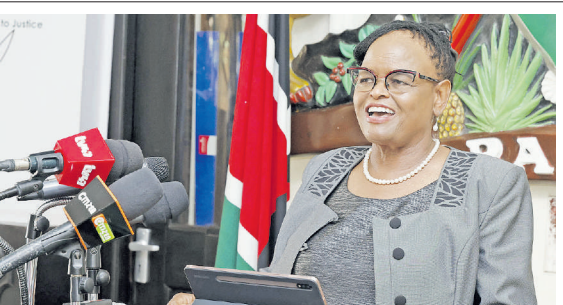

Judicial experts have called for the establishment of a fully operational International Crimes Division within the High Court in the aftermath of the Gen Z protests and ahead of the 2027 polls.
The experts—including judges from Kenya, Uganda and South Africa—said such a division would support victims of grave crimes such as genocide, war crimes, crimes against humanity and transnational crimes by enabling them to confront perpetrators in court and attain justice.
They spoke on Tuesday during a justice symposium organised by the Wayamo Foundation and the Strathmore Institute for Advanced Studies in International Criminal Justice (SIASIC). The forum was opened by Chief Justice Martha Koome.
Koome said discussions around international crimes were timely, given the increasing frequency and intensity of regional conflicts that demand urgent legal redress.
“Our region is living through hard realities. Conflicts in the neighbourhood test the resilience of institutions and the reach of law. International bodies continue to report on atrocities that demand sustained, coordinated responses," she said.
"Prosecutors, both domestic and international, are pressing forward in difficult environments. The imperative that emerges is uncomplicated: we must each do our part, at speed, within the law.”
High Court judge Diana Mochache said a dedicated division would ensure specialised attention to grave crimes and serve as a tool for confronting impunity.
“I’m obsessed with this court. I sleep and dream about this court. I have seen how specialised courts have efficiently dealt with complex issues and ensured deterrence,” she said during a panel discussion.
Judge Mochache cited examples such as the JKIA law courts that focuses on drug-related offences, and the Kahawa law courts and Milimani anti-corruption court, which handle terrorism and corruption cases, respectively. She said Kenya is ready for a standing division focused on international and transnational crimes.
Mochache said with the 2027 general election expected to be highly contested, having a domestic court would allow easier access to witnesses and enable proceedings in a context and language familiar to victims and witnesses—unlike the often distant and complex processes of the International Criminal Court (ICC) in The Hague.
Judge Alexander Muteti said a specialised division is necessary to address the impunity often perpetrated by individuals in high office.
“You cannot expect to use the ordinary High Court systems to confront the flagrant impunity we see. It is important to enact such a division and resource it adequately,” he said.
Ugandan High Court judge Susan Okalany, who sits in Uganda’s International Crimes Division, said Kenya has fallen behind as a regional leader in jurisprudence by not establishing a similar court.
“If we in Uganda has this division, why not you? You are lagging behind in this area, and there is an urgent need to set it up,” she said.
Wayamo Foundation director Bettina Ambach said Kenya has the potential to exercise universal jurisdiction over international crimes committed in the region to hold the perpetrators accountable.
“I come with the conviction that the pursuit of accountability for international crimes should be a creative endeavour, one that explores different mechanisms at international, regional and national levels to achieve some measure of justice,” Bettina said.
Currently, Kenya does not have a permanent or operational International Crimes Division. While a working committee recommended establishing one within the High Court in 2012, and it has been proposed as a means to deliver justice for post-election violence, little progress has been made towards its actualisation.
In Kenya, international crimes are governed by the International Crimes Act, 2008, which domestically implements the Rome Statute.
The Act grants the High Court jurisdiction to try international crimes and covers transnational crimes such as money laundering, human trafficking and cybercrime.
Instant Analysis:
Kenya risks falling behind in regional justice leadership without a dedicated International Crimes Division. Judicial experts argue that with rising conflicts and looming elections, the time to act is now.

![[PHOTOS] China holds massive parade to mark 80th anniversary of WWII](/_next/image?url=https%3A%2F%2Fcdn.radioafrica.digital%2Fimage%2F2025%2F09%2Fbd5dfa7a-3a06-486e-b6b0-6b032c0ffc73.jpg&w=3840&q=100)









